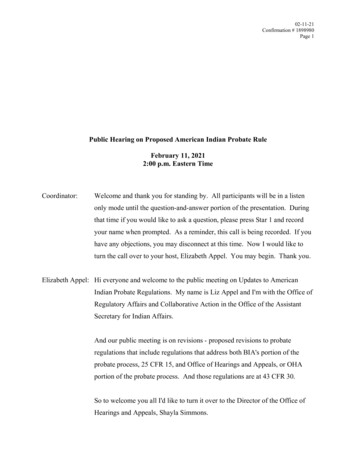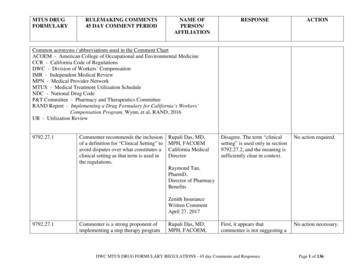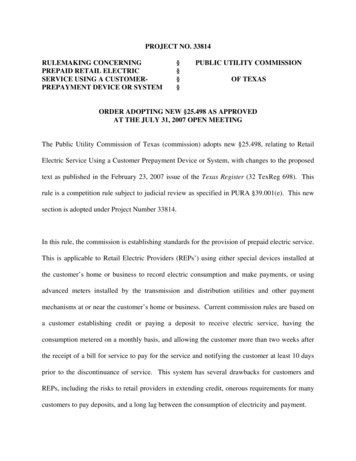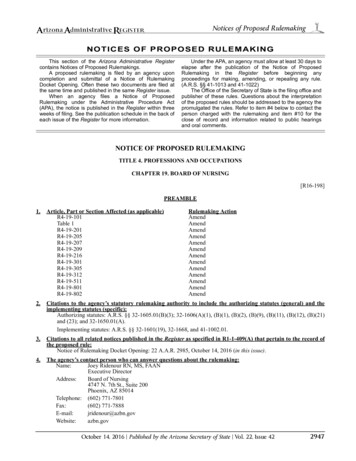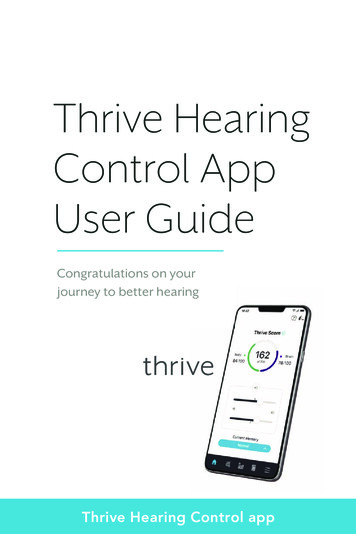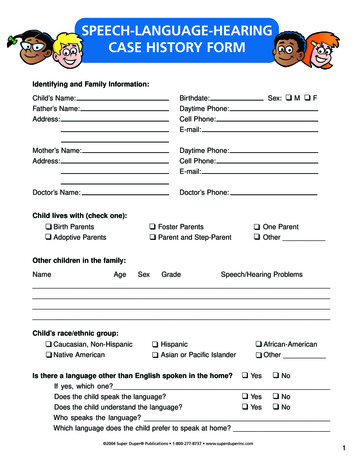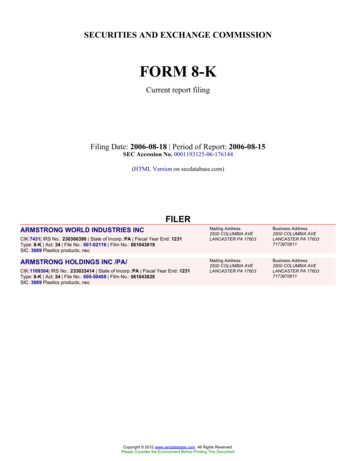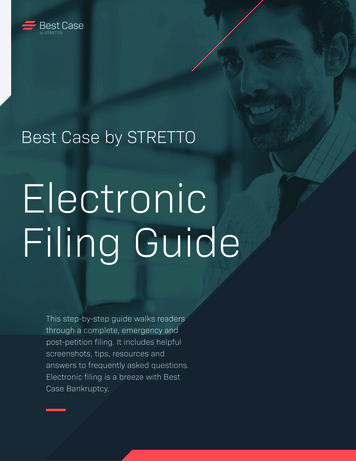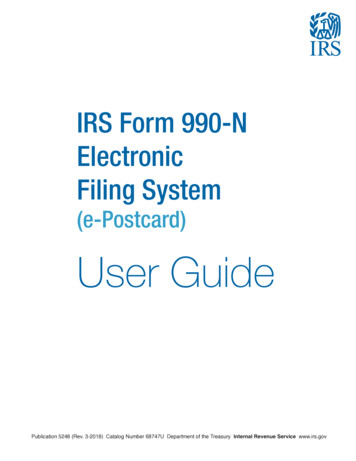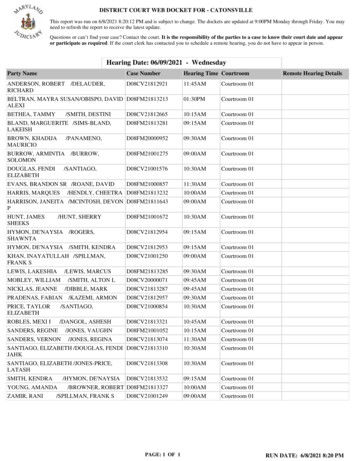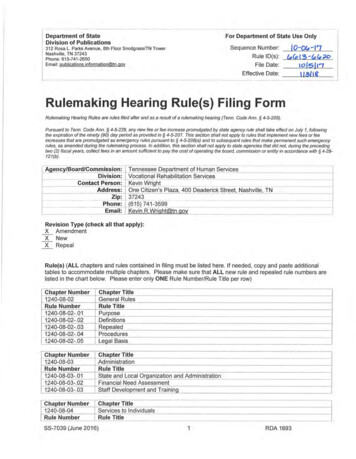
Transcription
----- --------------------- -- - - - - - - - - - - - - - ----------·-· -----·--··----------Department of StateDivision of PublicationsFor Department of State Use OnlyI0-0 -1'7 42lD('3'(p"-;;lOSequence Number:312 Rosa L. Parks Avenue, 8th Floor SnodgrassrrN TowerNashville, TN 37243Phone: 615-741-2650Email: publications.information@tn.govRule ID(s):l0{5lt"7File Date:Effective Date:- - 1.l3 ( 1g Rulemaking Hearing Rule{s) Filing FormRulemaking Hearing Rules are rules filed after and as a result of a rulemaking hearing (Tenn. Code Ann. § 4-5-205).Pursuant to Tenn. Code Ann. § 4-5-229, any new fee or fee increase promulgated by state agency rule shall take effect on July 1, followingthe expiration of the ninety (90) day period as provided in § 4-5-207. This section shall not apply to rules that implement new fees or feeincreases that are promulgated as emergency rules pursuant to § 4-5-208(a) and to subsequent rules that make permanent such emergencyrules, as amended during the rulemaking process. In addition, this section shall not apply to state agencies that did not, during the precedingtwo (2) fiscal years, collect fees in an amount sufficient to pay the cost of operating the board, commission or entity in accordance with § 4-29121 (b).- - ---- - - - - - . - - - - - - - -- - - - - - - - - - - - - - - - - - - - - - - - - - - - - - - - -Agency/Board/Commission: Tennessee Department of Human ServicesDivision: Vocational Rehabilitation Services- - -- - - - - - - - - - - - - - ---------!Cont a c t P e r s o n : - ---K e v in W rigb tAddress: One Citizen's Plaza, 400 Deaderick Street, Nashville, TN1 - - - - -- --Z i p : -37 2 4 3 1P h o n e---;: J§J } 741-3599-- - - - - - - -- - - - - - - - - - Email: K '{ir1. B:Wrigbt@tr1.govRevision Type (check all that apply):X AmendmentX NewX RepealRule(s) (ALL chapters and rules contained in filing must be listed here. If needed, copy and paste additionaltables to accommodate multiple chapters. Please make sure that ALL new rule and repea led rule numbers arelisted in the chart below. Please enter only ONE Rule Number/Rule Title per row)Chapter Number1240-08-02Rule 40-08-02-.041240-08-02-. 05Chapter TitleGeneral RulesRule TitlePurposeDefinitionsRepealedProceduresLegal BasisChapter Number1240-08-03Rule Number1240-08-03-.011240-08-03-.021240-08-03-. 03Chapter TitleAdministrationRule TitleState and Local Organization and Administration ---.····Financial Need AssessmentStaff Development and TrainingChapter Number1240-08-04Rule NumberChapter TitleServices to IndividualsRule TitleSS-7039 (June 2016)1.RDA 1693
1240-08-04-.011240-08-04-.021240-08-04-. 031240-08-04.-041240-08-04-.051240-08-04-. 06Referrals and Aoolications for VR ServicesIndividualized Plan for Employment .CounselinQ, Guidance, and Referral ServicesVocational Rehabilitation ServicesStandards for ClosinQ CasesPost-Employment ServicesChapter Number1240-08-05Rule Number1240-08-05-.011240-08-05-. 031240-08-05-.041240-08-05-.051240-08-05-. 061240-08-05-. 07Chapter TitleServices to Individuals: Related ProvisionsRule TitleOrder of Selection and Priority for ServicesConsideration of Comparable Services or Benefits and SubrogationConfidentialityRepealedTennessee Rehabilitation CenterCommunity Tennessee Rehabilitation CentersChapter Number1240-08-06Rule Number1240-08-06-. 01Chapter TitleServices to GroupsRule TitleRepealedChapter Number1240-08-07Rule Number1240-08-07-.01Chapter TitleRepealedRule TitleRepealedChapter Number1240-08-10Rule Number1240-08-10-.09Chapter TitlePersonal Care Assistance ProgramRule TitleRate of Payment for PCA ServicesChapter Number1240-08-11Rule apter TitleSupported Employment Services ProgramRule TitleDefinitionsEliQibility for Supported EmploymentProvision of ServicesSS-7039 (June 2016)2RDA 1693
Chapter 1240-08-04Services to IndividualsNew1240-08-04-.01 Referrals and Applications for VR Services.(1)The Division's Vocational Rehabilitation Program will receive referrals of individuals from any sourceby any means as long as the individual is present in the State. The referral source must provide theindividual's name and contact information.(2)An individual who has been referred to VR will be considered an applicant when the individual hascompleted and signed a VR application form or has otherwise requested services from VR and hasprovided VR information necessary to initiate an assessment to determine eligibility and priority forservices and is available to complete the assessment process.Authority: T.C.A. §§4-5-202; 71-1-105(12) ; 49-11 -601 et seq .; 29 U.S.C. §§ 720 et seq.; 34 C.F.R. §§ 361 .30;361.41; Executive Order No. 43.1240-08-04-.02 Individualized Plan for Employment.(1)An Individualized Plan for Employment (IPE) is initiated for each eligible individual in an open prioritycategory and reviewed annually and amended as needed. Vocational rehabilitation (VR) services areprovided in accordance with the approved IPE.(2)The IPE is developed by the eligible individual or, as appropriate, his or her representative , withassistance available, to the extent determined appropriate by the eligible individual, from thevocational rehabilitation counselor or through other technical assistance. A copy of the IPE will beprovided to each individual.(3)The IPE must be designed to achieve a specific employment outcome that is selected by theindividual that is consistent with the individual's unique strengths, resources, priorities, concerns,abilities, capabilities, interests, and informed choice, and that will result in competitive integratedemployment.(4)For students with disabilities, the IPE will include coordination with the goals, objectives and preemployment transition services identified by the individualized education program determinednecessary to contribute towards obtaining competitive integrated employment and a projected postschool employment outcome.Authority: T.C.A. §§ 4-5-202 ; 71-1-104; 71-1-105(12) ; 49-11 -601 et seq.; 29 U.S.C. §§ 720 et seq .; 34 C.F.R. §§361.45; 361.46; 361.5 ; Executive Order No. 43 .1240-08-04-. 03 Counseling, Guidance, and Referral Services(1)An individual with a disability is provided counseling , guidance, and referral services that arenecessary to develop or implement his or her vocational rehabilitation (VR) program.(2)Counseling and guidance is provided by the VR Counselor throughout the life of a case to facilitatethe provision of services and achievement of competitive integrated employment. It is a process inwhich a vocational rehabilitation counselor works one-to-one with an individual with a disability.(3)Referral means directing the individual to other entities for assistance and/or services not availablefrom VR.Authority: T.C.A. §§4-5-202; 71 -1-104; 71-1 -105(12); 49-11-601 et seq.; 29 U.S.C. §§ 720 et seq.; 34 C.F.R. §§361.37; 361.48 ; Executive Order No. 43.SS-7039 (June 2016)3RDA 1693
1240-08-04-. 04 Vocational Rehabilitation Services.(1)The provision of vocational rehabilitation (VR) services and support needs is based on the vocationalrehabilitation and support needs of the individual consistent with the individual's strengths, resources ,priorities, concerns, abilities, capabilities, interests, informed choice and VR policy and procedures asdetermined by an appropriate assessment conducted by the appropriate staff and identified in theind ividual 's Individualized Plan for Employment.(2)VR services comprise services that contribute to the achievement of competitive integratedemployment and support services that enable an eligible individual to participate in contributingservices.(3)VR services must be provided in accordance with VR policy and procedure.(4)Prior to providing VR services, a determination must be made by VR as to the availability ofcomparable services and benefits and the extent to wh ich the comparable services or benefits can beutilized to provide or pay for the VR services.(5)The provision of some VR services is based on the financial need of the individual as determ ined byVR in accordance with Rule 1240-08-03-.02. Based on the FNA some individuals must participate inthe cost of some VR servicesAuthority: T.C.A. §§4-5-202; 71 -1-104; 71 -1-105(12); 49-11 -601 et seq. ; 29 U.S.C. §§ 720 et seq .; 34 C.F.R. §§361.48; 361.5; Executive Order No. 43.1240-08-04-.05 Standards for Closing Cases.(1)The Division's VR Program may close a case from applicant status prior to making an eligibilitydetermination if the applicant declines to participate in, or is unavailable to complete, an assessmentfor determ ining eligibility and priority for services, and VR has made a reasonable number of attemptsto contact the applicant or, if appropriate, the applicant's representative, to encourage the applicant'sparticipation.(2)VR may close a case from trial work experiences if there is clear and convincing evidence that theind ividual is incapable of benefiting from vocational rehabilitation services in terms of an employmentoutcome due to the severity of an individual's disability.(3)VR may close a case because of a determination that applicant is ineligible for vocationalrehab ilitation services or that an eligible individual receiving services under an IPE is no longereligible for services.(4)VR may close a case of an individual who has achieved a successful employment outcome if all ofthe following requirements are met:(a)The individual has achieved competitive integrated employment described in the individual'sIPE that is: consistent with the individual's strengths, resources, priorities, concerns, abilities,capabilities, interests, and informed choice and is at a location typically found in the community(in the competitive labor market) where the client:1.Is compensated at not less than the legal minimum wage or at the customary rate for thesame or similar work performed by employees who are not individuals with disabilities;2.Is eligible for the level of benefits provided to other employees who are not individualswith disabilities;3.Interacts with fellow employees for the purpose of performing the job duties within thework unit who are not individuals with disabil ities;SS-7039 (June 2016)4RDA 1693
4.Has the opportunity for advancement that is similar for other employees who are notindividuals with disabilities and who have similar positions.(b)The employment outcome has been maintained for an appropriate period of time, but not lessthan ninety (90) days, to ensure the stability of the employment outcome; and the individual nolonger needs vocational rehabilitation services;(c)At the end of the appropriate period described in (b), the individual and the VR counselorconsider the employment outcome to be satisfactory and agree that the individual is performingwell in the employment; and(d)The individual is informed through appropriate modes of communication of the availability ofpost-employment services.Authority: T.C.A. §§4-5-202; 71 -1-104; 71-1-105(12); 49-11-601 et seq .; 29 U.S.C. §§ 720 et seq.; 34 C.F.R. §§361.44; 361 .55; 361 .56; Executive Order No. 43 .1240-08-04-. 06 Post-Employment Services.(1)Post-employment services are one or more vocational rehabilitation services that are providedsubsequent to the achievement of a successful employment outcome that are necessary for anindividual to maintain, regain , or advance in employment, consistent with the individual's strengths,resources , priorities, concerns, abilities, capabilities, interests, and informed choice.(2)Post-employment services must be provided under the terms of an Individualized Plan forEmployment (IPE).(3)Post-employment services are subject to the same requi rements as services leading to employment,including the requirement to consider and seek comparable benefits and services available underother programs and for a financial assessment.Authority: T.C.A. §§4-5-202 ; 71 -1-1 04; 71 -1-105(12); 49-1 1-601 et seq .; 29 U.S.C. §§ 720 et seq .; 34 C.F.R. §§361.48; 361 .5; and Executive Order No. 43.SS-7039 (June 2016)5RDA 1693
Chapter 1240-08-02General RulesAmendmentsRule 1240-08-02-. 01 Purpose is amended by deleting this rule in its entirety and substituting the followinglanguage so that as amended, this rule shall read:The Department of Human Services, Division of Rehabilitation Services is the designated State unit that isprimarily concerned with vocational and other rehabilitation of individuals with physical, mental and sensorydisabilities. The Division of Rehabilitation Services (the Division) is responsible for the Vocational RehabilitationProgram (VR Program) which includes the determination of eligibility, the determination of the nature and scopeof services, and the provision of rehabilitation services for individuals consistent with their strengths, resources,priorities, concerns, abilities, capabilities, interests, and informed choice so that they may prepare for and engagein employment.Authority: TC.A. §§4-5-202; 71-1-104 ; 71 -1-105(12); 49-11-601 et seq. ; 34 C.F.R. Part 361 ; Executive Order No.43 .Rule 1240-08-02-.02 Definitions, is amended by deleting this rule in its entirety and substituting the followinglanguage so that as amended, this rule shall read :The words and terms as used herein have the following meanings.(1)"Act" means the Rehabilitation Act of 1973, as amended by the Workforce Innovation and OpportunityAct of 2014, 29 U.S.C. §§ 720 et seq . Words and terms defined in federal law and regulations areadopted by reference into these rules ;(2)"Applicant" means an individual who applies to the Division for vocational rehabilitation services;(3)"Blind" means a person who had been determined to have not more than 20/200 vision acuity in thebetter eye with best correction, or an equally disabling loss of the visual field as evidenced by alimitation to the field of vision in the better eye to such a degree that its widest diameter subtends anangle of no greater than 20 degrees;(4)"Combined/Unified State Plan" means the plan for vocational rehabilitation services submitted by theDivision to the Rehabilitation Services Administration in compliance with Title I, Rehabilitation Act of1973, as amended by the Workforce Innovation and Opportunity Act of 2014.(5)"Commissioner" means the executive head of the Department of Human Services;(6)"Competitive Integrated Employment" means work that:(a)Is performed on a full-time or part-time basis (including self-employment) and for which anindividual is compensated at a rate that:1.Is not less than the higher of the rate specified in section 6(a)(1) of the Fair LaborStandards Act of 1938 (29 U.S.S. 206 (a)(1 )) or the rate required under the applicableState or local minimum wage law for the place of employment;2.Is not less than theperformed by othersimilarly situated intraining, experience,3.In the case of an individual who is self-employed, yields an income that is comparable tothe income received by other individuals who are not individuals with disabilities and whoare self-employed in similar occupations or on similar tasks and who have similartraining, experience, and skills; andSS-7039 (June 2016)customary rate paid by the employer for the same or similar workemployees who are not individuals with disabilities and who aresimilar occupations by the same employer and who have similarand skills; and6RDA 1693
4.(b)(c)Is eligible for the level of benefits provided to other employees; andIs at a location :1.Typically found in the community; and2.Where the employee with a disability interacts for the purpose of performing the duties ofthe position with the employees with the particular work unit and the entire work site, and,as appropriate to the work performed , other persons (e.g . customers and vendors) , whoare not individuals with disabilities (not including supervisory personnel or individuals whoare providing services to such employee) to the same extent that employees who are notindividuals with disabilities and who are in comparable positions interacts with thesepersons; andPresents, as appropriate, opportunities for advancement that are similar to those for otheremployees who are not individuals with disabilities and who have similar positions.(7)"Contributing Services" means services that help or cause to bring about the rehab ilitation of anindividual's functional limitations in order to achieve an employment objective, but do not includesupport services.(8)"Counselor" means an employee of the Tennessee Division of Rehabi litation Services who isdesignated in the job description as a counselor;(9)"Department" means the Tennessee Department of Human Services;(10)"Designated State Unit" means the Division of Rehabilitation Services, which is primarily concernedwith vocational and other rehabilitation of individuals with disabilities and is responsible for theadministration of the State's VR program ;(11)"Division" means the Division of Rehabilitation Services (the Division or DRS);(12)"Employment Outcome" means entering or retaining full-time or, if appropriate, part-time competitiveemployment in an integrated labor market to the greatest extent practicable; that meets the definitionfor competitive integrated employment; including supported, customized and self-employmentemployment; or any other type of employment that is consistent with an individual's strengths,resources , priorities, concerns , abilities, capabilities, interests , and informed choice;(13)"Fair Hearing" shall mean a contested case proceeding before an impartial hearing officer designatedby the Commissioner of the Department of Human Services who shall afford the individual and theDivision , or their authorized representatives, the opportunity to present their case, with or withoutwitnesses, to determine whether action or inaction by the county, area , regional , district, or stateoffice is erroneous and should be corrected . Each party has an opportunity to disclose all relevantfacts and issues, respond to and present evidence, conduct cross-examination, and submit rebuttalevidence as permitted under the Uniform Administrative Procedures Act, T.C.A. §§ 4-5-301 et seq .Hearings may be conducted by telephone , television , or other electronic means, and shall be open topublic observation unless otherwise provided by state or federal law. Hearings are conducted inaccordance with the Uniform Administrative Procedures Act codified at T.C.A. § 4-5-101 et seq . Anaggrieved party may obtain a review of any final order by appealing to chancery court in DavidsonCounty, the county of the official residence of the commissioner, or the county where one or more ofthe petitioners resides , in accordance with T.C.A. § 4-5-322 . If dissatisfied with the chancery court'sdecision , the individual may appeal further to the court of appeals of Tennessee, in accordance withT.C.A. § 4-5-323.(1 4) "Individual" means a person who has been referred or has applied for services and/or determinedeligible for and receives services from the Division ;(15)"Maximum Effort" means a specific method or action to ach ieve a particular benefit to pay forspecified rehab il itation services. It may consist of a set policy or process which may be applied inSS-7039 (June 2016)7RDA 1693
appropriate cases. For example , the Division could have a cooperative agreement with Stateuniversity officials for financial assistance officers to interview and evaluate the financial need of allDivision of Rehabilitation Services sponsored students;(16) "Qualified Personnel" means personnel possessing those specific qualifications and/or credentials forpersons providing a function for which such qualifications are required;(17) "Recipient" means an individual that is receiving Pre-Employment Transition Services. This individualis eligible or potentially eligible for VR services.(18) "Student with disability" means
1240-08-04-. 04 Vocational Rehabilitation Services. (1) The provision of vocational rehabilitation (VR) services and support needs is based on the vocational rehabilitation and support needs of the individual consistent with the individual's strengths, resources,

